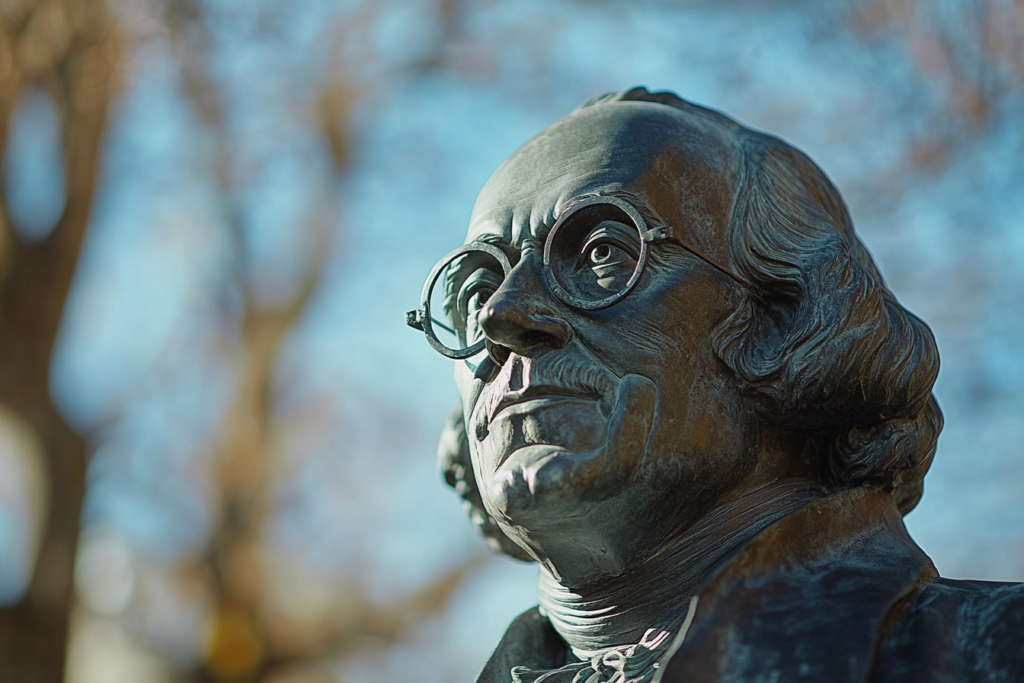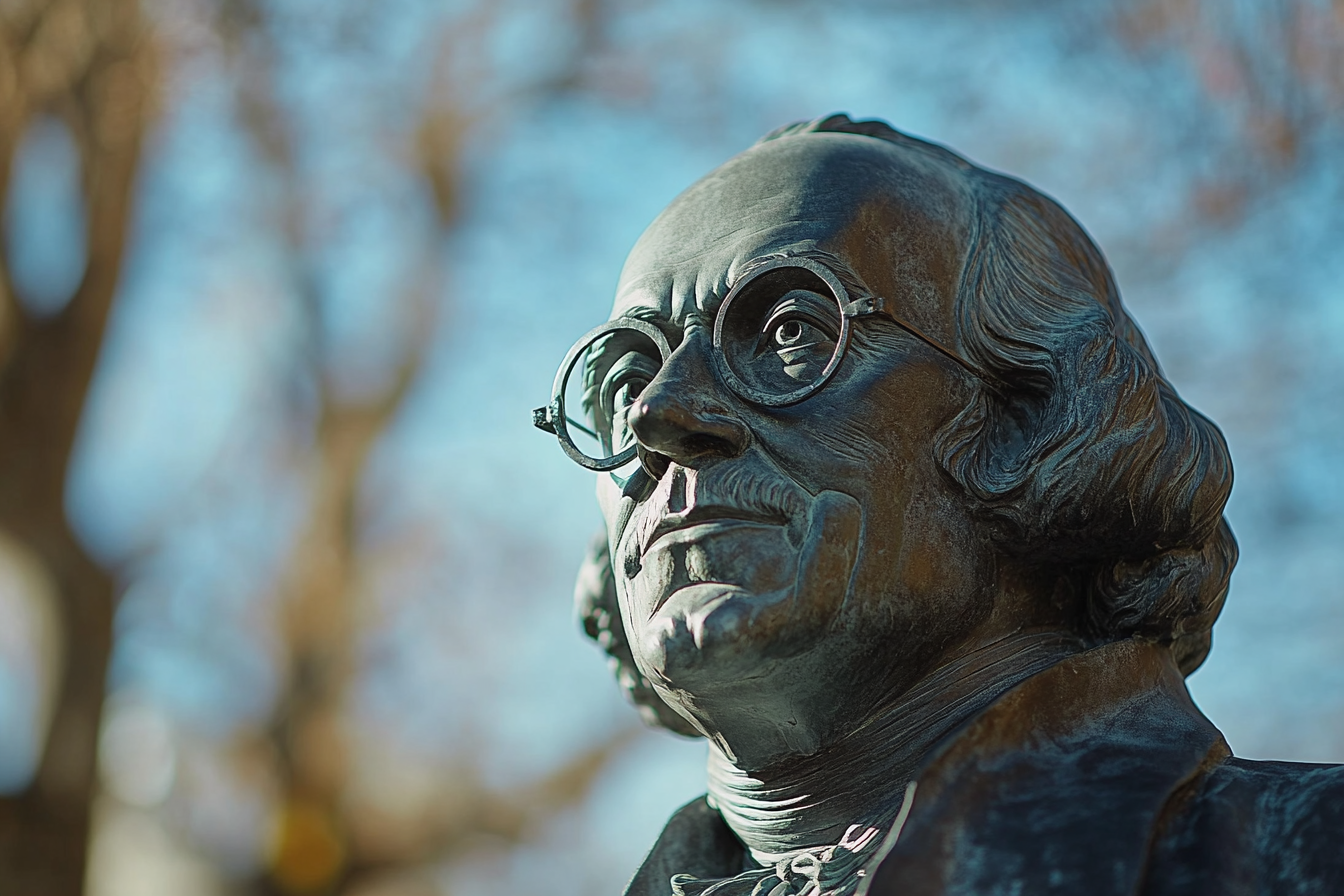
The Enlightenment, often called the Age of Reason, was an important intellectual movement that took place in Europe and the Americas during the 17th and 18th centuries.
This era focused on the power of reason, individual rights, and questioning traditional authorities, especially in religion and politics.
In America, the Enlightenment was particularly influential.
It played a key role in shaping the philosophical and political ideas that laid the foundation for the United States.
During this time, many thinkers began to challenge established norms and advocate for core principles like freedom, equality, and democracy.
These ideas became crucial in the development of American political thought and governance.
Key Thinkers of the American Enlightenment
Benjamin Franklin
Benjamin Franklin was a leading figure of the American Enlightenment, known for his diverse talents and contributions.
He was an inventor, scientist, diplomat, and writer, with a deep commitment to practical knowledge and societal improvement.
Franklin founded key institutions like the Library Company of Philadelphia, the American Philosophical Society, and the University of Pennsylvania.
These organizations promoted education and public debate, aligning with Enlightenment values.
His influence also reached politics. Franklin played a crucial role in drafting the Declaration of Independence and the U.S. Constitution, shaping American democracy with his support for free speech, a free press, and religious tolerance.
His famous saying, “An investment in knowledge pays the best interest,” continues to reflect his belief in the power of learning and civic responsibility.
- Read also: A Look Back in Time: The Most Impactful American History Events
- Read also: How Many U.S. Presidents Have Been Assassinated?
Thomas Jefferson

Thomas Jefferson, the third President of the United States, played a crucial role in the American Enlightenment.
His vision for the nation was heavily shaped by Enlightenment ideals like liberty and equality.
Jefferson believed in the power of reason and education to drive human progress, which was central to his political views.
Jefferson’s most notable achievement was writing the Declaration of Independence in 1776, a document declaring the colonies’ freedom from British rule.
This declaration highlighted his belief in natural rights—that everyone is equal and has the right to life, liberty, and the pursuit of happiness.
In addition to the Declaration, Jefferson’s impact on American thought is seen in his support for limited government, separation of church and state, and the need for an educated public.
He founded the University of Virginia to promote education, reflecting his commitment to these principles.
Jefferson’s legacy continues through the emphasis on individual rights and democracy in the United States.
Thomas Paine
Thomas Paine was a bold thinker and writer who played a significant role in both the American and European revolutions.
Originally from England, he moved to America in 1774 and quickly became a key figure in the fight for American independence.
His pamphlet Common Sense, published in 1776, made a strong case for breaking away from British rule and establishing a republic based on the people’s will rather than a monarchy.
Paine’s writing was straightforward and persuasive, which helped rally public support for the Revolution.
His ideas were deeply influenced by Enlightenment thinking, emphasizing reason and individual rights.
Paine’s impact didn’t stop with the American Revolution.
In his later works, such as The Rights of Man and The Age of Reason, he continued to challenge established authorities and promote ideas of freedom, equality, and secularism.
Despite being a controversial figure, Paine’s contributions were crucial in shaping Enlightenment thought and the development of democratic principles.
John Adams

John Adams, the second President of the United States, was a key figure in the American Enlightenment and a strong advocate for independence.
He was deeply inspired by Enlightenment ideas, especially those about law, governance, and the separation of powers.
Adams made significant contributions by helping to draft the Massachusetts Constitution, which influenced the U.S. Constitution.
He was a firm believer in a balanced government with checks and balances, a fundamental principle in American democracy.
He also played a vital role in pushing for independence from Britain, supporting the Declaration of Independence, and working to gain international support for the American cause.
Adams’s dedication to the rule of law and a government that serves its people reflected his Enlightenment values.
Legacy of Their Ideas in Modern Society
The ideas from the American Enlightenment have left a lasting mark on today’s society.
The principles of freedom, equality, and democracy that were championed by Enlightenment thinkers remain core to American identity and government.
The U.S. Constitution, which focuses on protecting individual rights, balancing government powers, and separating authorities, is a direct outcome of these Enlightenment ideas.
These concepts have also inspired global movements for democracy and human rights.
The American Revolution, driven by Enlightenment principles, became a model for other nations striving for independence and self-rule.
Thus, the impact of the American Enlightenment extends beyond the United States, influencing the spread of democratic values worldwide.
- Read also: Intellectual Brilliance: 7 Scottish Enlightenment Thinkers
- Read also: Breaking Barriers: 9 Women Philosophers in the Enlightenment Era
Final Thoughts
The American Enlightenment was a transformative period that shaped the United States and its values.
Thinkers like Benjamin Franklin, Thomas Jefferson, Thomas Paine and John Adams challenged traditional authority and advocated for the principles of reason, liberty, and equality.
Their ideas laid the foundation for American democracy and continue to influence modern society.
Understanding the contributions of these Enlightenment thinkers is essential to appreciating the ideals that underpin the United States and its ongoing commitment to freedom and justice.



